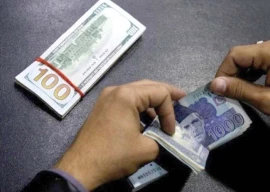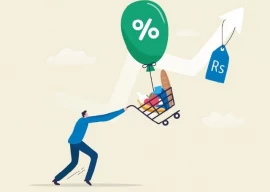
In the fast-paced world of the international bond market, nobody has the time or patience to listen to long-winded explanations, so the credit rating agency Standard & Poors’ assessment of Pakistan’s creditworthiness is remarkably blunt: the three-way political struggle between the executive, the judiciary and the military is the single biggest risk to Pakistan’s economic stability and it is growing.
In its latest country report on Pakistan, the New York-based S&P – one of the three largest credit rating agencies in the world – says that “the near-term risk of political instability in Pakistan has risen over the past several months” owing to the recent proceedings in the Supreme Court involving Prime Minister Yousaf Raza Gilani’s contempt proceedings. The court initiated those proceedings after the government failed to follow its directive to reopen corruption cases against President Asif Ali Zardari.
S&P did not beat about the bush in its view of what it felt was the motivation behind those proceedings. The credit rating agency stated that it believes the view expressed by some analysts that the Supreme Court is pursuing the case against the prime minister on behalf of the military as a backdoor method to weaken President Zardari.
It further says that “a deepening disagreement between the Pakistani government and the country’s judges and military commanders could weaken the sovereign creditworthiness (of Pakistan) further.”
Standard & Poor’s rates Pakistan a B- for its long-term creditworthiness and an appalling C for its short-term credit rating. Both of those ratings qualify bonds issued by the government of Pakistan as “junk”, requiring them to pay a higher interest rate than other governments around the world. Pakistan’s government bonds currently yield 11% on the international bond market.
The agency has a stable outlook for Pakistan though it did warn that it might review that assessment for a potential downward revision due to “political instability and security risks and the resultant negative impact on the policy environment.” In other words, the agency believes that the power players in Pakistan are too busy politicking and not spending enough time governing.
S&P last changed Pakistan’s long-term credit rating on August 24, 2009, and its short term rating on October 6, 2008. Both of those changes were upgrades.
The agency also stated that while it did not expect the government to collapse if Prime Minister Gilani is forced out of office, it did expect such an event to further weaken the effectiveness of the government. S&P also believes there is a high likelihood of an early election being called this year.
Economic outlook
Standard & Poor’s highlighted the fact that the country’s balance of payments have started coming under pressure. While remittances rose 19.5% in the first half of the fiscal year ending June 30, 2012, they could not keep pace with the 32% increase in the trade deficit. Foreign direct investment during that period fell almost 37% to $532 million. As a result, the current account deficit hit $2.4 billion for the first half of fiscal 2012, compared to an $8 million surplus in the same period the previous year.
Nonetheless, S&P feels that the government’s $17 billion in foreign currency reserves should be adequate to withstand external liquidity pressures but Pakistan could face problems if foreign aid continues to decline. The agency reckons Pakistan has $2.4 billion worth of debt repayments to make in 2012.
The agency maintained the stable outlook owing to the balance between the strong foreign currency reserves and the vulnerability stemming from the ongoing structural fiscal weaknesses and significant political and security risks.
“We could lower the rating if major slippages in policy occur, resulting in renewed balance of payments difficulties or a rising public debt trajectory,” said the agency in the report.
Published in The Express Tribune, March 7th, 2012.
COMMENTS (12)
Comments are moderated and generally will be posted if they are on-topic and not abusive.
For more information, please see our Comments FAQ

1717587923-0/jake-paul-vs-mike-tyson-(1)1717587923-0-165x106.webp)


1725443747-0/Untitled-design-(5)1725443747-0-165x106.webp)












"S&P did not beat about the bush in its view of what it felt was the motivation behind those proceedings. The credit rating agency stated that it believes the view expressed by some analysts that the Supreme Court is pursuing the case against the prime minister on behalf of the military as a backdoor method to weaken President Zardari."
Where exactly did S&P say this in its report?
Pak has no credit so don't worry about its image
Corruption devasted country totally
I can understand that institutional conflict is not good for the country in the short-term but having an opinion about why it is happening (army working through judiciary to oust the govt.) is something that does not fall within the ambit of S&P...not because they are right or wrong...but this does not fall within the scope of their core competencies. Secondly, it is the same agency that made a convenient mistake of about $2 Trillion in its calculations while downgrading US last summer, so they would benefit from tightening their quantitative data analysis rather than jumping into a much more fluid area of political analysis.
@John B:
The present debt-to-GDP ratio of under 60% is sustainable. The real question is the outlook. Is it expected to go up and under what assumptions?
These rating agencies are trying very hard to re-build their image that was badly battered in the crisis in 2008.
Read the SBP quarterly report, the current debt load is unsustainable and the political climate and domestic law and order is getting out of control.
The ratings were over due for PAK, salvageable, but not with chest thumping and protests.
@Shahbaz Rana: Is this report downloadable for free?
Image counts when dealing in the international community and political intrigue combined with xenophobic anti Western attitudes don't go over well when trying to establish credit.
The Baloch people must issue bonds to fund the independence movement. Perhaps international support for us will be translated in to money.
We need to do belt tightening. The salaries of all highly paid functionaries should be slashed, including generals, and judges, especially when their actions are directly destabilizing the country politically as well as economically.
These are same rating agencies which rated AAA for toxic assets all over the world. I wouldn't trust company which can take money to put AAA ratings on over-leveraged toxic assets.
Yes it's bad for the economy but it's a necessary evil, all developed nations have gone through a similar phase in their history. Once an equilibrium is reached, the country will stabilise and so will the economy. Power concentrated in any one of these institutions is very dangerous, now that would be REALLY bad for the economy.